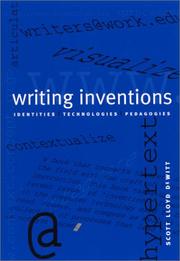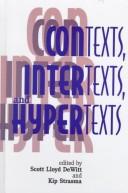| Listing 1 - 6 of 6 |
Sort by
|

ISBN: 1417500247 9781417500246 0791450406 9780791450406 0791450392 9780791450390 0791490319 Year: 2001 Publisher: Albany, New York : State University of New York Press,
Abstract | Keywords | Export | Availability | Bookmark
 Loading...
Loading...Choose an application
- Reference Manager
- EndNote
- RefWorks (Direct export to RefWorks)
Winner of the 2002 Computers & Composition Distinguished Book Award presented by Clarkson University's Eastman Kodak Center for Excellence in CommunicationThe increasing role of computer technology in the classroom has left many teachers searching for resources that will make sense of complex theories and provide them with practical pedagogical direction. Offering instructional stories, histories, and classroom applications, Writing Inventions connects the theoretical aspirations of the field with the craft of innovative composition instruction. Focusing on issues of "invention," the book explores "writing inventions"—the computer technology that students use to research, read, create, and compose. But "invention" also refers to the rich collection of processes that lead to what is not yet known: topics for writing, personal and professional identities, and new pedagogies. Methods for teaching invention using the World Wide Web are also outlined, arguing that the Web allows students and teachers to see into each other's learning processes. In the end, Writing Inventions tells stories—instructional accounts of computers and teaching writing that balance theory and practice.
English language --- Report writing --- World Wide Web. --- Hypertext systems. --- Rhetoric --- Study and teaching --- Technological innovations. --- Data processing. --- Study and teaching (Higher) --- Study and teaching. --- Research paper writing --- Research report writing --- Term paper writing --- Authorship --- Hypertext --- Interactive multimedia --- W3 (World Wide Web) --- Web (World Wide Web) --- World Wide Web (Information retrieval system) --- WWW (World Wide Web) --- Hypertext systems --- Multimedia systems --- Internet --- Germanic languages

ISBN: 1572732156 Year: 1999 Publisher: Cresskill (N.J.) : Hampton press,
Abstract | Keywords | Export | Availability | Bookmark
 Loading...
Loading...Choose an application
- Reference Manager
- EndNote
- RefWorks (Direct export to RefWorks)
English language --- Hypertext systems. --- Lerarenopleiding --- Report writing --- Rhetoric --- Computer-assisted instruction. --- Study and teaching. --- Algemeen.
Book
ISBN: 164802078X 9781648020780 9781648020766 1648020763 9781648020773 1648020771 Year: 2020 Publisher: Charlotte, North Carolina : Information Age Publishing, Inc.,
Abstract | Keywords | Export | Availability | Bookmark
 Loading...
Loading...Choose an application
- Reference Manager
- EndNote
- RefWorks (Direct export to RefWorks)
"This book offers easily implemented strategies for use with secondary and undergraduate students regarding issues of diversity to promote greater awareness of diversity and social justice within their classrooms. Defining diversity broadly, the book provides effective pedagogical techniques to help students question their own assumptions, think critically, and discuss issues within race, religion, ethnicity, gender, sexual orientation, socioeconomic status, and ability. The K-12 student population is increasingly diverse in terms of race, ethnicity, language, religion, socio-economic status, and family structure. However, the overwhelming majority of teachers continues to come from White, non-urban, middle class backgrounds (Fletcher, 2014; Hughes et al., 2011) These differences can have serious repercussions for student learning. Non-majority students who feel that their culture or background is not acknowledged or accepted at school are likely to disengage from expected academic and social activities (Hughes et al., 2011). Concurrently, the majority students remain unaware of privilege and ignorant of societal systemic discrimination. In order to teach for social justice, ideas regarding power structure, privilege, and oppression need to be discussed openly. Fear of upsetting students or not knowing how to handle the issue of social justice are commonly heard reasons for not discussing "difficult" subjects (Marks, Binkley, & Daly, 2014). However, when teachers choose not to discuss topics within diversity, students assume that the topics are taboo, dangerous, or unimportant. These assumptions impede students' abilities to ask important questions, learn how to speak about issues effectively and comprehend the complex challenges woven into current national conversations"--
Multicultural education --- Culturally relevant pedagogy --- Minorities --- Multiculturalism --- Cultural pluralism --- Education --- Study and teaching
Book
Year: 2013 Publisher: Utah State University Press/ Computers and Composition Digital Press
Abstract | Keywords | Export | Availability | Bookmark
 Loading...
Loading...Choose an application
- Reference Manager
- EndNote
- RefWorks (Direct export to RefWorks)
Stories That Speak to Us—a digital collection of scholarly, curated exhibits—is designed to investigate literacy narratives from a number of perspectives: to explore why they are important, what information they carry about reading and composing, why they might be valuable, not only for scholars and teachers, but also for librarians, community literacy workers, individual citizens and groups of people. As the editors and authors collectively suggest, literacy narratives are powerfully rhetorical linguistic accounts through which people fashion their lives; make sense of their world, indeed construct the realities in which they live. Literacy narratives are sometimes laden so richly with information that conventional academic tools and ways of discussing their power to shape identities; to persuade, and reveal, and discover, to create meaning and affiliations at home, in schools, communities, and workplaces, are inadequate to the task. For this reason, the collection focuses on the work of both narrative theorists and literacy educators. The curated exhibits in Stories That Speak to Us provide analyses of narratives selected by the author/scholars from among the more than 3,500 narratives preserved in the Digital Archive of Literacy Narratives (DALN), a publicly available online archive of personal literacy narratives in a variety of formats (text, video, audio) that recount contributors’ literacy practices and values in their own words. The motif of exhibits and curators is employed in part to suggest the relationship between the narratives “on display” in this particular project and the much larger collection of narratives in the DALN as a whole—the narratives “on display” here constitute less than two percent of the entire archive. The Stories That Speak to Us collection allows visitors to study the literacy narratives in the exhibits directly via links to the DALN, while the essays in this collection constitute something analogous to exhibit catalogs. The individual exhibits examine themes such as “betweenity,” scaffolding, digital divides, ethnolinguistic vitality, ludic literacies, black women’s literacy narratives, the convergence of local and global discourses about literacy, feminism and digital literacy, and transnational “thirdspaces” of literacy. At the end of the collection, we suggest some ways to explore, and provide some tools for exploring, these and other topics in the entire archive.
Literacy. --- Narration (Rhetoric) --- DALN --- literacy narratives --- computers and writing
Book
Year: 2013 Publisher: Utah State University Press/ Computers and Composition Digital Press
Abstract | Keywords | Export | Availability | Bookmark
 Loading...
Loading...Choose an application
- Reference Manager
- EndNote
- RefWorks (Direct export to RefWorks)
Stories That Speak to Us—a digital collection of scholarly, curated exhibits—is designed to investigate literacy narratives from a number of perspectives: to explore why they are important, what information they carry about reading and composing, why they might be valuable, not only for scholars and teachers, but also for librarians, community literacy workers, individual citizens and groups of people. As the editors and authors collectively suggest, literacy narratives are powerfully rhetorical linguistic accounts through which people fashion their lives; make sense of their world, indeed construct the realities in which they live. Literacy narratives are sometimes laden so richly with information that conventional academic tools and ways of discussing their power to shape identities; to persuade, and reveal, and discover, to create meaning and affiliations at home, in schools, communities, and workplaces, are inadequate to the task. For this reason, the collection focuses on the work of both narrative theorists and literacy educators. The curated exhibits in Stories That Speak to Us provide analyses of narratives selected by the author/scholars from among the more than 3,500 narratives preserved in the Digital Archive of Literacy Narratives (DALN), a publicly available online archive of personal literacy narratives in a variety of formats (text, video, audio) that recount contributors’ literacy practices and values in their own words. The motif of exhibits and curators is employed in part to suggest the relationship between the narratives “on display” in this particular project and the much larger collection of narratives in the DALN as a whole—the narratives “on display” here constitute less than two percent of the entire archive. The Stories That Speak to Us collection allows visitors to study the literacy narratives in the exhibits directly via links to the DALN, while the essays in this collection constitute something analogous to exhibit catalogs. The individual exhibits examine themes such as “betweenity,” scaffolding, digital divides, ethnolinguistic vitality, ludic literacies, black women’s literacy narratives, the convergence of local and global discourses about literacy, feminism and digital literacy, and transnational “thirdspaces” of literacy. At the end of the collection, we suggest some ways to explore, and provide some tools for exploring, these and other topics in the entire archive.
Literacy. --- Narration (Rhetoric) --- DALN --- literacy narratives --- computers and writing
Book
Year: 2013 Publisher: Utah State University Press/ Computers and Composition Digital Press
Abstract | Keywords | Export | Availability | Bookmark
 Loading...
Loading...Choose an application
- Reference Manager
- EndNote
- RefWorks (Direct export to RefWorks)
Stories That Speak to Us—a digital collection of scholarly, curated exhibits—is designed to investigate literacy narratives from a number of perspectives: to explore why they are important, what information they carry about reading and composing, why they might be valuable, not only for scholars and teachers, but also for librarians, community literacy workers, individual citizens and groups of people. As the editors and authors collectively suggest, literacy narratives are powerfully rhetorical linguistic accounts through which people fashion their lives; make sense of their world, indeed construct the realities in which they live. Literacy narratives are sometimes laden so richly with information that conventional academic tools and ways of discussing their power to shape identities; to persuade, and reveal, and discover, to create meaning and affiliations at home, in schools, communities, and workplaces, are inadequate to the task. For this reason, the collection focuses on the work of both narrative theorists and literacy educators. The curated exhibits in Stories That Speak to Us provide analyses of narratives selected by the author/scholars from among the more than 3,500 narratives preserved in the Digital Archive of Literacy Narratives (DALN), a publicly available online archive of personal literacy narratives in a variety of formats (text, video, audio) that recount contributors’ literacy practices and values in their own words. The motif of exhibits and curators is employed in part to suggest the relationship between the narratives “on display” in this particular project and the much larger collection of narratives in the DALN as a whole—the narratives “on display” here constitute less than two percent of the entire archive. The Stories That Speak to Us collection allows visitors to study the literacy narratives in the exhibits directly via links to the DALN, while the essays in this collection constitute something analogous to exhibit catalogs. The individual exhibits examine themes such as “betweenity,” scaffolding, digital divides, ethnolinguistic vitality, ludic literacies, black women’s literacy narratives, the convergence of local and global discourses about literacy, feminism and digital literacy, and transnational “thirdspaces” of literacy. At the end of the collection, we suggest some ways to explore, and provide some tools for exploring, these and other topics in the entire archive.
Literacy. --- Narration (Rhetoric) --- DALN --- literacy narratives --- computers and writing
| Listing 1 - 6 of 6 |
Sort by
|

 Search
Search Feedback
Feedback About UniCat
About UniCat  Help
Help News
News